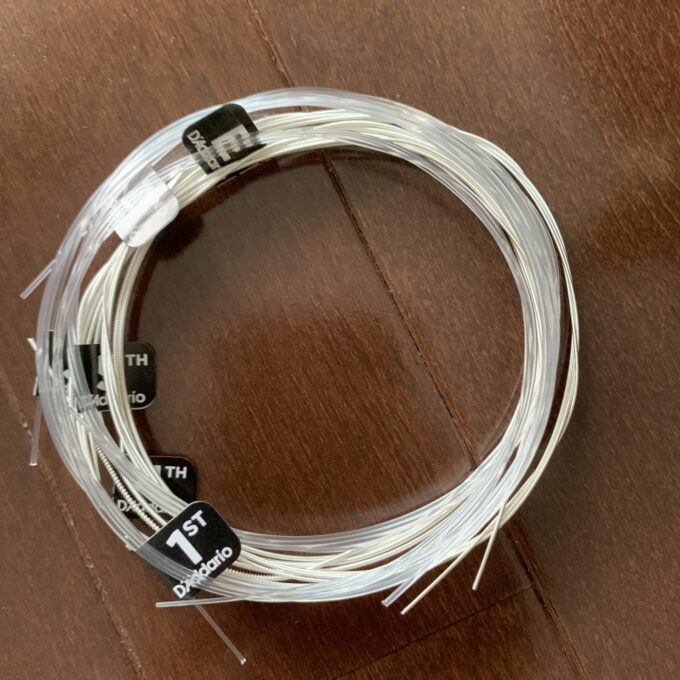This post is also available in:
![]() 日本語 (Japanese)
日本語 (Japanese)
Classical guitar strings are not meant to last forever, they are consumable. They gradually lose their sound and eventually break. So what is the end of life and when should you replace them?
This article briefly explains the life of strings and when to replace them. For more information on how strings deteriorate and how to extend their life, please refer to the following articles
- What happens to classical guitar strings when they deteriorate?
- The sound of the bass strings becomes dull and blurred.
- The part of the bass string that touches the fret is dented and the plating comes off.
- Scratches on the treble strings
- The sound of treble strings loses its luster.
- I can feel the tension of the strings strongly.
- Bass strings rust.
- Wound strings of bass strings are removed.
- break a string
- At what stage of life is it considered a lifetime?
- Is there a problem with using strings that are beyond their useful life?
- How long does it take to degrade?
- Is there a string with a longer life span or a way to extend its life?
- Always want to enjoy good sound.
What happens to classical guitar strings when they deteriorate?
An essential part of a classical guitar is the strings. The more you use them, the more they deteriorate. It doesn’t matter how good your instrument is, if you use deteriorated strings, it will be ruined. The more you use them, the more they deteriorate.
So what happens when a string deteriorates? Let’s take a look at the timeline.
The sound of the bass strings becomes dull and blurred.
The first change to come is in the bass strings, which are the wound strings.
The bass strings, which at first sounded bright and sharp, become Gradually, the sound becomes dull and blurred. .
The sound is different from the soft and mellow sound, which could be called dull.
The part of the bass string that touches the fret is dented and the plating comes off.
Next, the wound strings of the bass strings will gradually become dented where they hit the frets.
And gradually The silver plating on the surface is removed to reveal the copper color inside. .
Scratches on the treble strings
The area where the treble strings hit the frets and where you play with your fingernails will gradually become scratched.
The scratches may cause noise when you play. It is possible that scratches can cause noise when played.
The sound of treble strings loses its luster.
The treble strings also gradually change in sound.
The original sweet and lustrous sound that I was able to produce… It’s gradually losing its luster. But now it’s not.
The sound will be tasteless, as if you are playing plastic.
I can feel the tension of the strings strongly.
Gradually, the string loses its elasticity. The tension of the strings seems to be getting stronger. The string becomes less and less elastic.
Bass strings rust.
The plating on the bass strings or the copper in them rusts.
If the plating is rusted, the color will be blackish; if the copper is rusted, the color will be green to blue. When copper rusts, it turns green to blue.
Wound strings of bass strings are removed.
The bass strings continue to be struck against the frets. Instead of plating, the wound strings are removed, exposing the core wire inside. The bass strings kept hitting the frets.
break a string
The bass string is from the point where the core wire is exposed. The string will break. The bass strings are broken where the core wire is exposed.
The treble strings do not break easily, but the part that hits the fret is still weak.
At what stage of life is it considered a lifetime?
So, at what point should you consider a string that is changing in this way to be at the end of its life and replace it?
The real life span is when it runs out.
There is no set lifespan. The time to change is when you feel you want to change.
I say “degraded,” but some people like the sound of a new string after it has “degraded,” while others like the sound of a new string.
However, if the If it runs out, you can’t use it anymore, so I guess you could say that this is its real life span. I’m not sure. I think it’s rare for people to use it that much.
If you want to get the most out of your guitar, at least change it when the bass strings get rusty.
The appeal of the classical guitar is its variety of tones. Its tone is brought out by the brilliance and sharpness of the bass strings and the luster of the treble strings.
For this reason, it can be said that using strings that have deteriorated too much detracts from the appeal of the guitar.
At the very least, I want to replace the bass strings when they get rusty. At this stage, the sound of the bass strings has deteriorated and the treble strings have lost much of their luster. At this stage, the sound of the bass strings has deteriorated completely, and the treble strings have lost much of their luster. It’s time to change all six strings.
If possible, I’d like to change it if the sound deteriorates.
However, I would still like to always play my guitar with a good sound.
For this reason, it would be a good idea to change the treble strings when you feel that they have lost their luster.
This decision is difficult to make if you can’t produce a glossy sound, so the next choice is when rust appears.
Is there a problem with using strings that are beyond their useful life?
If the string is used until it breaks, there is a Hitting the instrument itself when it is cut and damaging it If the string is used until it breaks, there is a possibility of injury. If the string is used until it breaks If the string breaks while you are playing, it may hit you and injure you. If the string is used until it breaks, it may cause injury to your body.
Even if you don’t go that far, the string will gradually lose its elasticity and the tension will feel stronger, making it more difficult to play.
If you play with a bad sound, you will not be able to fully use the changes in tone, and your range of expression will be limited.
There is also a theory that if you play a guitar with a bad sound, the guitar will remember that sound and the guitar will sound bad. I don’t know if this is true or not, but I’ve heard that the wood remembers the vibrations.
How long does it take to degrade?
This depends on how long you play and what kind of strings you use.
If you play for about an hour every day, the bass strings should be replaced in about three to four weeks. The treble strings will last a little longer. The treble strings will last a little longer, so you can replace them once for every two bass strings. However, if you have a good ear, you may want to replace the bass strings as well, since you can feel the deterioration.
If you don’t play much, it will last longer, but even if you don’t play at all, the strings will deteriorate because they will rust. They will inevitably get rusty. You should change them every two months or so. I think it’s a good idea.
Is there a string with a longer life span or a way to extend its life?
There are several ways to do this.

See also the following article for a more detailed explanation of string life.
Loosen the tension of the strings when not playing the instrument.
The easiest way to do this is to After you’re done playing the guitar, you need to loosen the tension on the strings. The easiest way to do this is to Strings are made to sound best when they are in tune, which means that they are just barely holding their tension. If you loosen the string windings about four times, the strings will last longer.
However, there are those who say that it is better for the instrument not to loosen the tension. I don’t think I need to worry about it, and Kono Guitar Works and Yamaha recommend loosening it.
There is also the method of removing the strings after every note, but I have never seen anyone do that because it seems to be bad for the instrument.
Wipe the strings after you finish playing.
It is also a good idea to wipe the strings with a cloth after you finish playing the instrument to prevent rust.
Sweat from your hands is more likely to rust than moisture in the air, because of the salt content. So, wiping it off is effective.
You can use a clean cloth, but you can also use these goods:
There are also goods with the concept of scientifically removing rust and dirt to revive the sound of the strings.
Use strings with a long life span.
There are many different types of strings, and some strings are marketed as having a long life.
For example D’Addario’s Pro Arte EXP and XT have a coating on the strings that makes them rustproof and hard to break! :
Made in Japan Figaro core wires are coated to extend their life :
Using these types of strings is one way to go. However, you will have to try them out to see if the longer-lasting strings suit your sound preferences.
(Postscript): I’ve collected strings that have a long life span.
Always want to enjoy good sound.
Although they are consumable, strings are an important part of a classical guitar. If they are not in good condition, they will never produce a good sound.
If you want to know more about the principle of string deterioration and its lifespan, please refer to the following articles:
Also, strings that have reached the end of their life should be reused or properly sorted and disposed of in the garbage.












